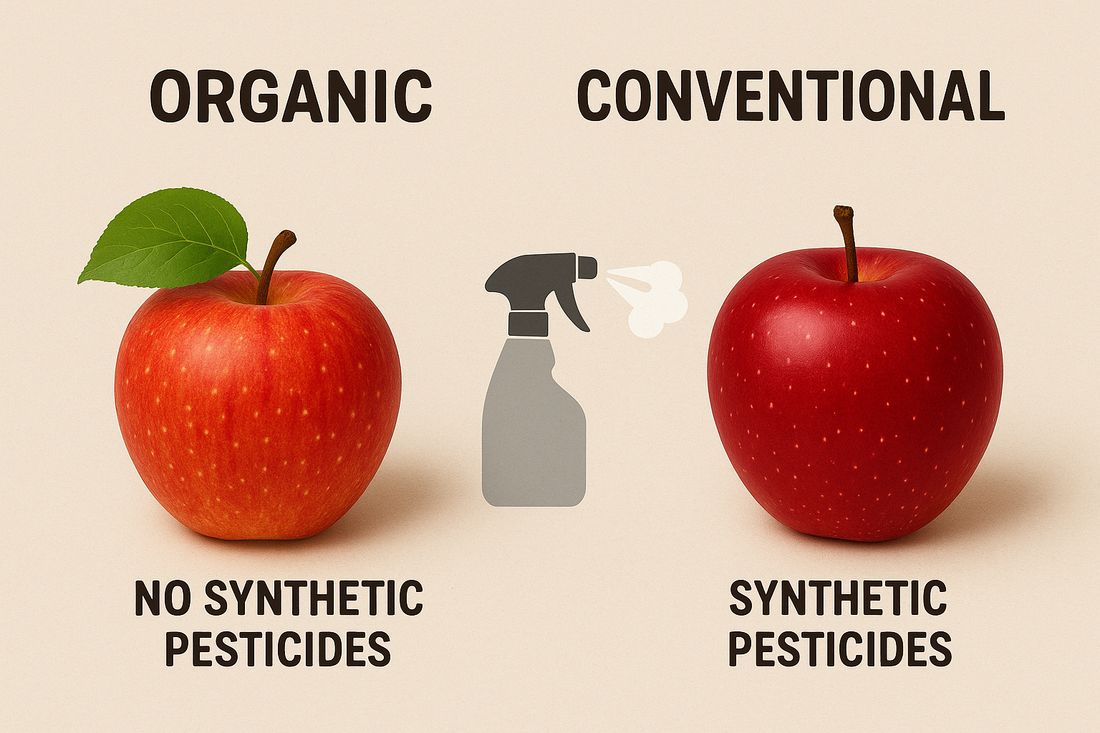
Organic vs. Conventional: A Clear Look at Your Food Choices
You've stood in the grocery aisle and faced the choice: the shiny, conventional apple or the slightly more expensive organic one. What’s the real difference? At Organic Grocer, we believe in transparency. This guide offers a clear, side-by-side comparison of organic vs. conventional farming practices, breaking down the facts on pesticides and nutrition so you can make an informed choice for your health and the environment.
Pesticides: A Tale of Two Farming Practices
The most significant and well-documented difference between organic vs. conventional food is pesticide use. This is where the core philosophy of each farming method truly diverges.
- Conventional Farming: This approach relies heavily on synthetic pesticides and herbicides to protect crops from pests and weeds and maximize yields. These chemicals are designed to be effective and are used to ensure a consistent, abundant crop. While these chemicals are regulated, residues can remain on the final produce.
- Organic Farming: The organic model operates on the principle of working with nature. Instead of synthetic chemicals, farmers use natural pest control methods. This includes companion planting (using one plant to deter pests from another), crop rotation to disrupt pest life cycles, and natural substances like neem oil. While organic farming isn't entirely "pesticide-free," the types of pesticides permitted are naturally derived and break down more quickly in the environment. Studies consistently show that organic produce has significantly lower pesticide residue levels than conventional produce.
The Nutritional Debate: What Does the Research Say?
When it comes to nutrition, the comparison between organic vs. conventional food is more nuanced. While both are incredibly important for a healthy diet, the latest research points to some subtle but meaningful distinctions.
- Antioxidants: Multiple studies, including a major meta-analysis, suggest that organic fruits and vegetables can have higher concentrations of antioxidants. These plant compounds are crucial for protecting our cells from damage. One reason for this is that organic plants, without the protection of synthetic pesticides, produce more of these natural defenses to fight off pests and disease.
- Vitamins and Minerals: The evidence here is less conclusive. While some studies show higher levels of specific vitamins (like Vitamin C) and minerals (like phosphorus) in organic produce, the results can be inconsistent. Factors like soil quality, plant variety, and even the time of harvest can all play a significant role.
- Nitrate Levels: Organic produce has been shown to have lower nitrate levels. Nitrates can be harmful in high amounts, and the synthetic fertilizers used in conventional farming often contribute to their higher concentration in plants.
Ultimately, the most important nutritional choice you can make is to eat a variety of fruits and vegetables, regardless of how they were grown. However, choosing organic produce offers a way to boost your intake of certain beneficial compounds while reducing your exposure to synthetic chemicals.
Making an Informed Choice: A Simple Guide
The debate of organic vs. conventional is not about one being "bad" and the other "good." It's about understanding the choices you have.
- For Health: Choosing organic produce is a simple way to reduce your intake of synthetic pesticide residues. This can be especially important for children and pregnant women.
- For the Environment: The practices behind organic farming, like promoting soil health, protecting biodiversity, and avoiding water pollution from chemical runoff, are a cornerstone of sustainable living. Your choice supports a farming model that nurtures the planet.
- For Your Wallet: Conventional produce is often more affordable due to higher yields and less labor-intensive practices. A great way to balance cost and benefit is to prioritize buying organic from the "Dirty Dozen" list (foods with the highest pesticide residues) and choose conventional for the "Clean Fifteen" (foods with the lowest).
At Organic Grocer, we stand by the purity and integrity of our products. We offer a curated selection of 100% organic food, giving you the power to choose what's best for your family and for the planet. Whether you're a lifelong organic enthusiast or just beginning your journey, we're here to help.
Ready to taste the difference that pure, earth-kind eating makes? Explore our collection today and make your next meal a conscious choice.
